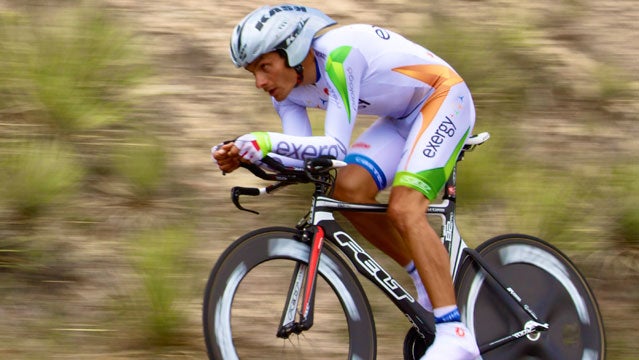Not long after “Fast” Freddie Rodriguez won the US National Road Race Championships last week, the about his doping started.
Nevermind that Rodriguez passed the doping controls. Forget the fact that, with three previous national titles to his name, he was hardly a surprise winner. Disregard all the characteristics of the Chattanooga race that played into his hands: the short 100-mile length; the Jelly Belly racing team that dedicated themselves to his service while World Tour pros like Brent Bookwalter, Matthew Busche, and Ted King raced solo; the eventual sprint finish.
Though all the evidence points to Rodriguez winning fair and square, armchair pundits still doubted him. They roasted him because he’d beaten a scrum of youngsters from the newer, cleaner generation; because earlier in his career he competed against and occasionally beat racers we now know to have doped; because he once rode for notorious doping teams such as Rock Racing. His win, the critics said, was just another vestige of the “doping era” that Rodriguez came up in.
I say nonsense.
I completely understand the fatigue and skepticism among cycling fans, but I’m equally tired of this guilt-by-association mentality that casts everyone—and the entire sport of cycling—under a Livestrong yellow cloud. In light of the insinuations, I made some calls to ask about Rodriguez’s credibility and I couldn’t find anyone with any evidence to denounce him. He has a long career with a succession of good—but not outrageous—results, and he’s never been publicly implicated in doping or suspended. In light of Lance’s now-comical “I never failed a test” defense, the cynics say that this isn’t enough. But if that’s the case, what will ever satisfy us?
It’s not just Rodriguez either. Following Vincenzo Nibali’s domination at the Giro d’Italia last month, tongues immediately started to wag. The arguments against him were just as circumstantial as those leveled at “Fast” Freddie. Nibali was too dominant to be credible, critics charged, and beside that, he rides for Astana, a team with a checkered past.
One cycling publication even wrote an about doping and Nibali’s winning ride. They eventually concluded that there is “no proof to indicate” that the Sicilian didn’t ride clean, but I’d argue that spending 2,000 words enumerating all the reasons why he might have doped is almost as damaging in the court of public opinion as simply saying he did it. In this cynical environment, any press with the suggestion of doping is bad press, and I think it’s a little irresponsible to continue damning rule-abiding cyclists with implication and conjecture. In spite of the sordid history, we have to put some faith where faith is due.
Some will disagree and point to the recent doping positives at the Giro d’Italia as justification. On May 24, the day that Stage 19 from Ponte di Legno to Val Martello was cancelled due to snow, news came that Danilo di Luca had returned a for EPO in an out-of-competition doping control just prior to the race. And a few days after the Giro, di Luca’s Vini Fantini-Selle Italia teammate, Mauro Santambrogio, also returned an for EPO from a sample collected on stage one. Neither rider has confessed and both are awaiting the analysis of their B samples, but the news provided plenty of fuel for those who doubt that cycling is cleaning up. Cynics quickly pointed to Stage 14, which Santambrogio won by shaking everyone in the race—except Nibali. The intimation, of course, is that a clean racer isn’t capable of riding wheel-to-wheel with one who is doped.
I don’t see it that way. Di Luca’s positive comes as zero surprise—he was banned after the 2007 Giro for working with controversial physician Carlo Santuccione and after the 2009 Giro for testing positive for the EPO variant CERA—and the fact that he and Santambrogio were caught is evidence that the system is working. It’s also been reported that the two Italians’ positives likely resulted from the same new testing procedure for EPO that recently caught Russia’s Alexander Serebryakov . As the maglia rosa on Stage 14, Nibali would have undergone that more stringent testing that netted his two compatriots. By my estimation, that makes Nibali even more likely to be clean.
Perhaps it’s naïve to think that cycling is cleaning up. Perhaps in a few weeks or months or years, the other cleat will drop and we’ll find out that doping is still rampant in the peloton and that the record books must again be re-written and the current winners expunged. But the fact is, there’s less empirical basis for that sort of mistrust than there is for putting our confidence in riders such as Nibali and Rodriguez, who have ridden great races and, according to the rules, shown themselves to be clean.
Beyond the fairness of presuming riders innocent until they show themselves otherwise, I choose to believe in cycling because, simply, I enjoy it. If every rider were questionable and every win suspect, there would be no point in watching bike racing at all. Many fans have said as much and defected from the sport entirely. I respect that much more than the disenchanted zealots who continue to tune in just to grouse about the dopers and cast doubt on every result.
Personally, I still got a thrill watching Nibali shred the peloton to bits on the snowy ramps of the Tre Cime di Lavaredo. And I jumped out of my chair seeing Rodriguez pip Brent Bookwalter at the line in Chattanooga. If those things don’t excite you—if all you were thinking was, “I bet they’re juiced,”—perhaps you should consider tuning into a new sport. There’s .


